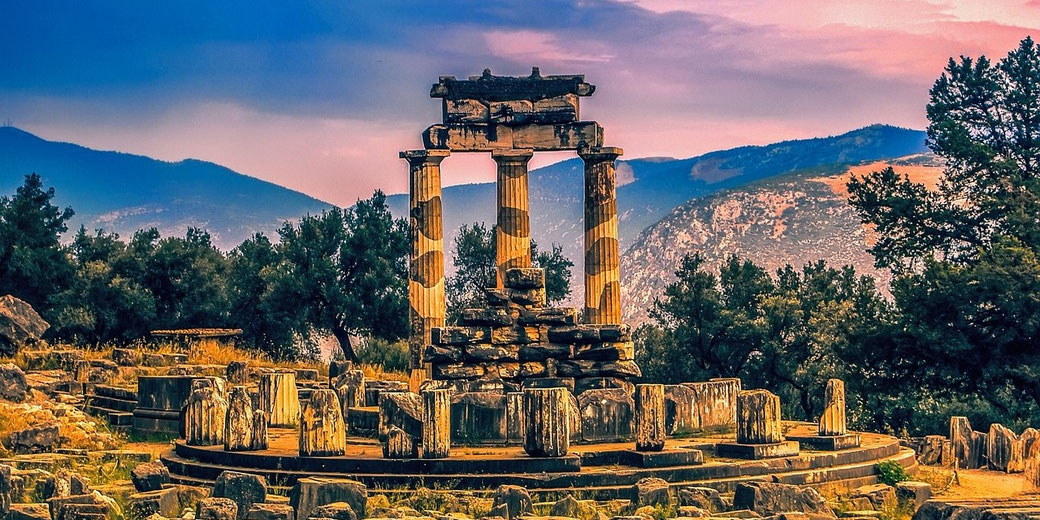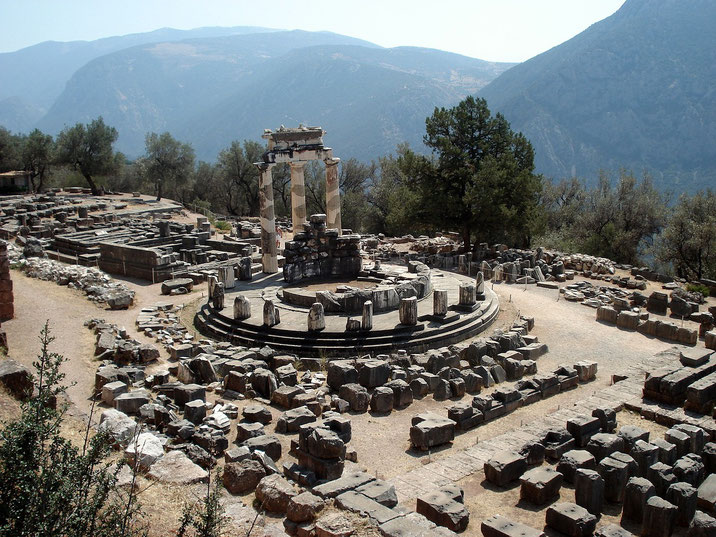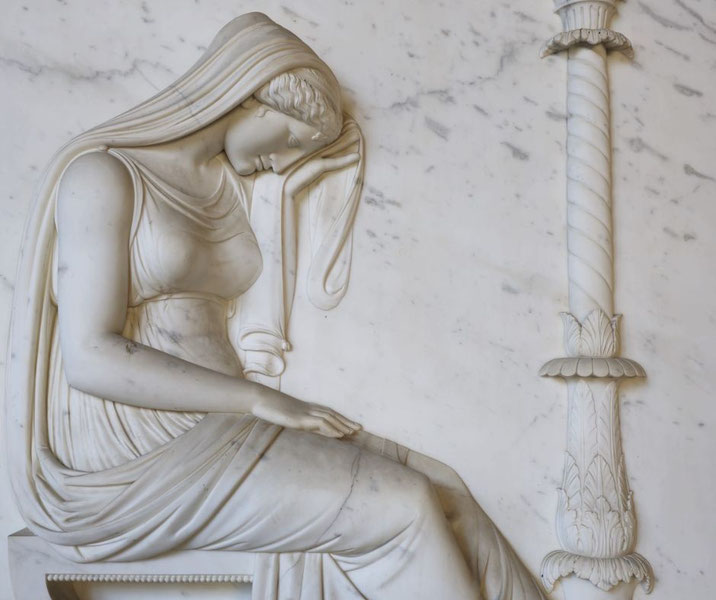Ancient Greece's most famous oracle: The Oracle of Delphi

In the heart of ancient Greece, nestled on the slopes of Mount Parnassus, lay a sacred site that was believed to be the center of the universe.
This site was the home of the most famous oracle in ancient Greece, the Oracle of Delphi.
For centuries, people from all over the world traveled to this mystical place seeking guidance and wisdom from the Pythia, the priestess who was said to be possessed by the spirit of Apollo.
The prophecies delivered by the Pythia were shrouded in mystery and often had profound effects on the lives of those who sought her counsel.
What was the Oracle of Delphi?
The ancient Greeks believed that the gods communicated with mortals through oracles, and the most famous of these oracles was the Oracle of Delphi.
Located on the slopes of Mount Parnassus in central Greece, the Oracle of Delphi was the most important religious sanctuary in the ancient Greek world.
The Oracle was established around the 8th century BCE, although there is evidence of earlier use of the site during the Mycenaean period (c. 1400 BCE), making it one of Greece's oldest religious sites.
The Oracle was dedicated to the god Apollo, who, according to legend, killed a giant serpent on the site. The location was then considered sacred, and a temple was built to honor Apollo.
At the center of the sanctuary was the Omphalos stone, which the ancient Greeks believed marked the exact center of the world as designated by Zeus.

Why was it so famous?
The oracle was famous for its prophecies, which were delivered by the Pythia, a priestess who was believed to be possessed by the spirit of Apollo.
She was considered to be the mouthpiece of the god Apollo, through whom he spoke to mortals.
The Pythia would sit on a tripod, inhaling the fumes of burning bay leaves and barley.
This induced a trance-like state during which she would deliver the Oracle's message in a cryptic and often ambiguous way.
Another priestess or priest would then interpret the message and deliver it to the visitor in a form that could be understood.
Modern theories suggest the trance-like state may have been induced by inhaling ethylene gas from a fissure in the earth at Delphi.
The Pythia was considered to be an important figure in ancient Greece, and her words were believed to carry great weight.
Her prophecies were sought by people from all over the Greek world and even beyond, and her influence extended into the political and military spheres.
However, the Pythia's role was not without controversy, and there were instances where her prophecies were questioned or rejected by those who sought her advice.
How did people become a Pythia priestess?
The Pythia was chosen from among local women who met certain criteria, such as being of good character, having a pure family lineage, and being free from physical disabilities.
The selection process involved various rituals and tests, including drinking from the sacred spring at the temple and spending time in its inner sanctum where the Oracle was delivered.
Once chosen, the Pythia was required to live at the temple and maintain a strict regimen of fasting, purification, and ritual activities.
On the seventh day of each month, she would perform a ritual in which she would symbolically prepare a table for the god Apollo and his companions.

What did people ask the Pythia?
People asked the Oracle of Delphi a wide range of questions, seeking advice and guidance on various topics.
The questions were typically phrased in a way that required a yes or no answer, and the answers were often cryptic or open to interpretation.
One of the most common reasons for visiting the Oracle was to seek advice on personal matters.
For example, people might ask whether they should marry, have children, or pursue a particular career path.
Another common topic was politics. Many politicians and rulers sought the Oracle's advice on matters such as war and diplomacy.
For example, they might ask whether they should go to war with a particular city-state, whether they would be victorious in battle, or which political course of action would be the best for their city-state.
Religious matters were also a common topic. People might ask about matters related to their religious beliefs or practices, such as whether they should participate in a particular ritual or whether a particular deity was pleased with them.
People believed that the Oracle had a direct connection to the gods and could provide insight into the natural world as well as the supernatural.
The renowned poet Pindar frequently praised the Oracle of Delphi in his works, calling it the 'navel of the world' and celebrating its role in connecting humanity with the divine.
Famous people who visited the Oracle
Throughout its history, the Oracle of Delphi was visited by a wide range of people, including politicians, generals, philosophers, and ordinary citizens seeking advice or guidance.
Solon was an Athenian statesman and lawmaker who lived in the 6th century BCE.
He visited the Oracle of Delphi and was advised to "keep the middle ground" in politics, a lesson he took to heart and applied in his reform efforts in Athens.
Croesus was the king of Lydia, a powerful kingdom in Asia Minor, during the 6th century BCE.
He visited the Oracle of Delphi to seek advice on whether he should attack the Persians.
The Oracle advised him that if he attacked the Persians, he would destroy a great empire.
Unfortunately, the Oracle did not specify which empire would be destroyed, and Croesus interpreted the prophecy to mean that he would be victorious.
He launched an attack on the Persians but was ultimately defeated and captured.
Socrates was a philosopher who lived in Athens during the 5th century BCE. His friend Chaerephon visited the Oracle of Delphi on his behalf and asked if there was anyone wiser than Socrates. The Oracle said there was not.
This pronouncement inspired Socrates to devote himself to a life of philosophy and to seek knowledge and wisdom through questioning.
Finally, Alexander the Great, the famous conqueror, reportedly visited the Oracle of Delphi before embarking on his campaign to conquer Persia.
The Oracle confirmed his divine status and predicted his success in the campaign. Alexander considered the Oracle's endorsement an important factor in his success.
Its use in manipulation of politics
The Oracle of Delphi was known for its role in politics. Leaders from all over Greece sought the Oracle's advice on matters of state, and its prophecies often influenced important decisions.
The historian Herodotus documented several accounts of the Oracle's prophecies, including its advice to the Athenians during the Persian Wars.
In the early 5th century BCE, the Persian Empire threatened to invade Greece, and the Athenians consulted the Oracle of Delphi for guidance.
The Oracle advised the Athenians to trust in their wooden walls, which was later interpreted as a reference to the city's navy.
The Athenians took this advice and successfully defeated the Persians in the Battle of Salamis.
This victory was a turning point in the Persian Wars and helped to establish Athens as a dominant power in Greece.
Another example of the Oracle's political influence is its support for Sparta. The Oracle of Delphi was a strong supporter of Sparta, and many Spartan leaders consulted the Oracle for advice.
During the Peloponnesian War, the Oracle of Delphi advised the Spartans to seek the help of the god Apollo in their battle against the Athenians.
The Spartans took this advice and won a crucial battle against the Athenians.
Decline in importance
The Oracle of Delphi continued to be an important religious center throughout the classical period of Greece.
However, it declined in importance after the rise of Christianity and it closed after emperor Theodosius issued an edict against pagan temples in the 4th century CE.
Today, the site of the Oracle of Delphi is a popular tourist destination, and visitors can still see the remains of the temple, the theater, and the stadium.
The ancient site provides a fascinating glimpse into the religious and political life of ancient Greece and the importance of oracles in the ancient world.
The Oracle of Delphi was the most famous oracle in ancient Greece and played a significant role in the religious and political life of the ancient Greeks.
Its prophecies were sought by leaders from all over Greece, and its influence extended beyond religion.
Although the Oracle is no longer active, it continues to capture the imagination of visitors who are drawn to its mystical past and the enigmatic prophecies of the Pythia.
What do you need help with?
Download ready-to-use digital learning resources
Copyright © History Skills 2014-2025.
Contact via email
With the exception of links to external sites, some historical sources and extracts from specific publications, all content on this website is copyrighted by History Skills. This content may not be copied, republished or redistributed without written permission from the website creator. Please use the Contact page to obtain relevant permission.





